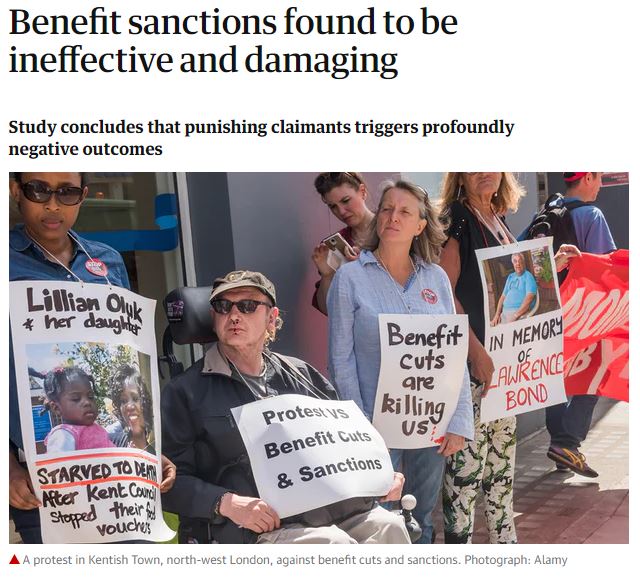
Five-year research by universities condemns sanctions.
Report on disabled people here
Research covers Jobseekers, Universal Credit (UC) recipients, disabled people, migrants, lone parents, ‘offenders’, social tenants, homeless people, and those subject to anti-social behaviour (ASB) interventions and Family Intervention Projects (FIP). More
Guardian article below:
“Benefit sanctions are ineffective at getting jobless people into work and are more likely to reduce those affected to poverty, ill-health or even survival crime, the UK’s most extensive study of welfare conditionality has found.
The five-year exercise tracking hundreds of claimants concludes that the controversial policy of docking benefits as punishment for alleged failures to comply with jobcentre rules has been little short of disastrous.
“Benefit sanctions do little to enhance people’s motivation to prepare for, seek or enter paid work. They routinely trigger profoundly negative personal, financial, health and behavioural outcomes,” the study concludes.
Despite claims by ministers in recent years that rigorously enforced conditionality – including mandatory 35-hour job searches – incentivised claimants to move off benefits into work, the study found the positive impact was negligible.
It calls for a review of the use of sanctions, including an immediate moratorium on benefit sanctions for disabled people who are disproportionately affected, together with an urgent “rebalancing” of the social security system to focus less on compliance and more on helping claimants into work.
In the “rare” cases where claimants did move off benefits into sustained work, researchers found that personalised job support, not sanctions, was the key factor. With few exceptions, however, jobcentres were more focused on enforcing benefit rules rather than helping people get jobs, the study found.
“Although some examples of good practice are evident, much of the mandatory job search, training and employment support offered by Jobcentre Plus and external providers is too generic, of poor quality and largely ineffective in enabling people to enter and sustain paid work,” it says.
For those people interviewed for the study who did obtain work, the most common outcome was a series of short-term, insecure jobs, interspersed with periods of unemployment, rather than a shift into sustained, well-paid work.
“The outcomes from sanctions are almost universally negative,” said the director of the study, Prof Peter Dwyer of the University of York.
The study found that, in many cases, the threat of sanctions had the unintended effect of encouraging a “culture of counterproductive compliance and futile behaviour” among some claimants, who learned “the rules of the game” rather than becoming genuinely engaged with work.
Claimants with chaotic lives – who were homeless or had addictions, for example – reacted to the “inherent hassle” of the conditionality system by dropping out of the social security system altogether. In some cases, they moved into survival crime, such as drug dealing.
Low-paid workers on universal credit who were subject to so-called “in-work conditionality” – a requirement for them to work more hours or face sanctions – in some cases elected to sign off, foregoing rent support and tax credits, to avoid what they saw as constant, petty harassment from jobcentre staff.
Welfare conditionality – the notion that eligibility for benefits and services should be linked to claimants’ compliance with certain rules and behaviours – has been progressively embedded into the UK social security system since the 1990s, although the scope and severity intensified dramatically after 2012.
Sanctions are imposed when claimants supposedly breach jobcentre rules, typically by failing to turn up for appointments or applying for enough jobs. They are effectively fined by having their benefit payments stopped for a minimum of four weeks (about £300) and a maximum of three years.
At its peak in 2013, under the then secretary of state for work and pensions, Iain Duncan Smith, there were more than a million sanctions. Between 2010 and 2015, a quarter of all people on jobseeker’s allowance were sanctioned, with the Department for Work and Pensions (DWP) issuing £132m in sanctions penalties in 2015.
Sanctions fell to 350,000 in 2016 as a series of critical reports emerged questioning their effectiveness and calling for changes, including from the all-party work and pensions select committee, the DWP’s social security advisory committee and the National Audit Office. A fresh inquiry by MPsinto sanctions is under way.
The Economic and Social Research Council-funded welfare conditionality study was carried out between 2013 and 2018 by researchers at six universities. It included repeat qualitative interviews over two years with 481 welfare service users in England and Scotland as well as interviews with 57 policy experts and 27 focus groups.
Dalia Ben-Galim, the policy director at the single parents’ charity Gingerbread, said: “Rather than threatening single parents with sanctions and widening the ‘conditionality’ agenda, it would be much more valuable to enable the conditions to support employment such as affordable childcare, access to flexible work and personalised support through job centres.”
A DWP spokesperson said: “Our research shows that over 70% of JSA claimants say sanctions make it more likely they will comply with reasonable and agreed requirements, and it is understandable that people meet certain expectations in return for benefits.
“We tailor requirements to individual cases and sanctions are only used in a very small percentage of cases when people fail to meet their agreed requirements set out in their claimant commitment.”
Labour’s shadow secretary for work and pensions Margaret Greenwood said: “The current sanctions system is immoral and ineffective. It is not helping people into employment and at the same time is leaving vulnerable people on the brink of destitution, without any source of income for long periods.”
Discover more from WinVisible
Subscribe to get the latest posts sent to your email.

Reblogged this on Britain Isn't Eating.
A 100% of J S A appeals in Coventry have been overturned just showing they shouldn’t have been issued in the first place, as said by Coventry MP Colleen Fletcher this week in a debate in Parliament. Two years back, the main Coventry job centre was sanctioning 500 people a MONTH, NOW THE CLAIMANT COUNT IS 2,500 WHICH IS SHOCKING.